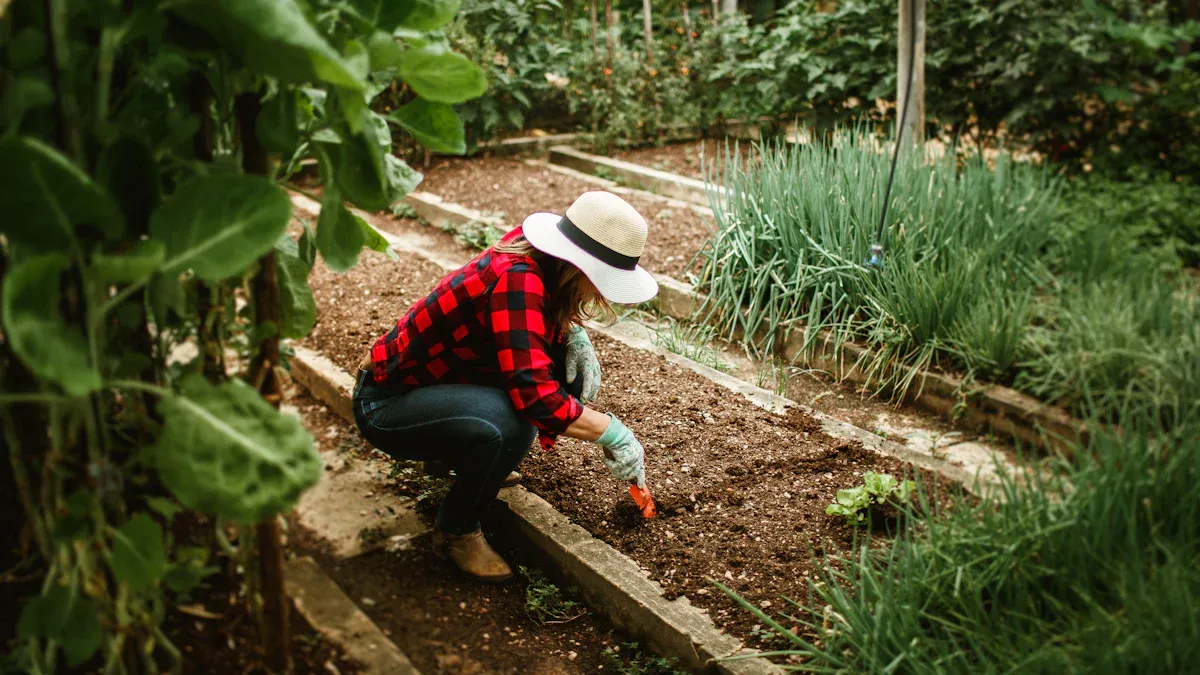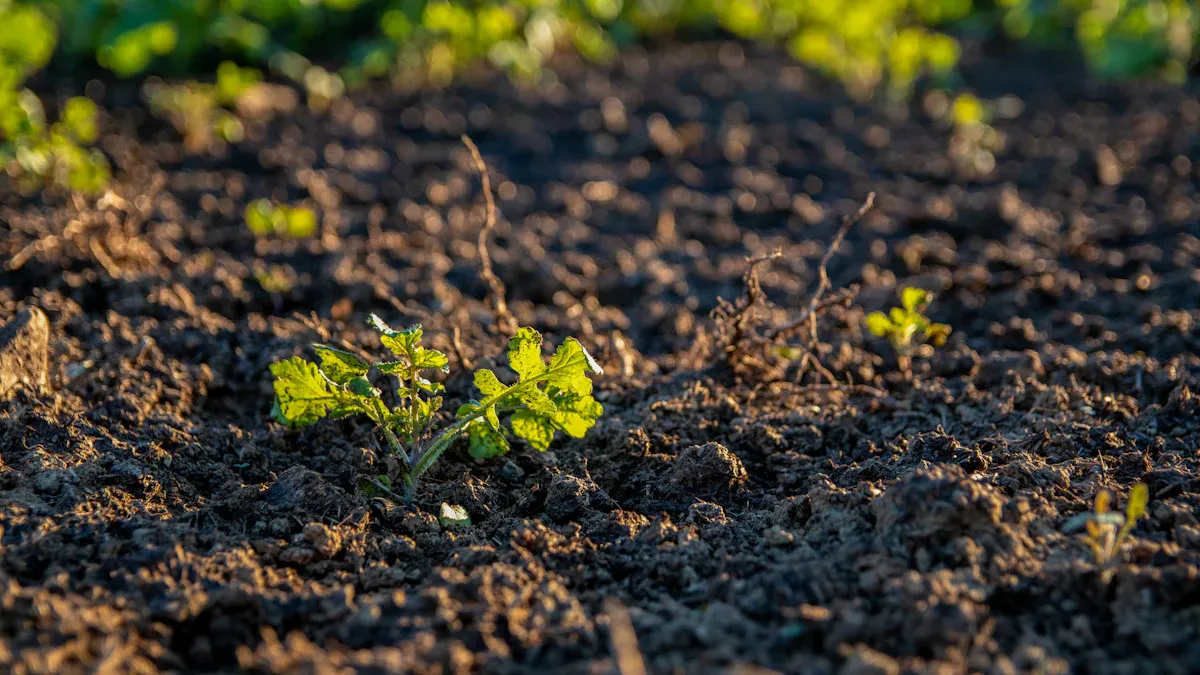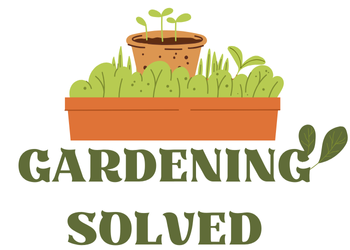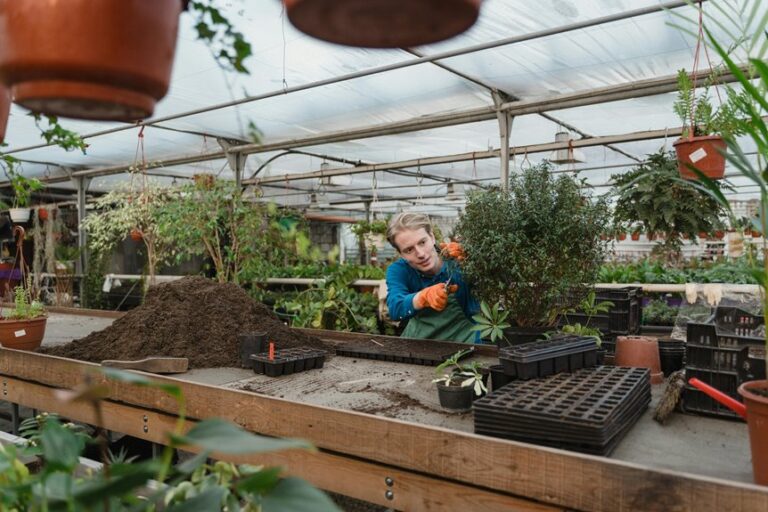
Are you looking for a way to boost your garden’s health naturally? The compost tea benefits could be your answer! This nutrient-rich liquid not only enhances soil structure but also introduces beneficial microorganisms. These tiny allies help your plants absorb nutrients better, making them stronger and more resistant to diseases. With compost tea, you’re not just feeding your plants; you’re nurturing a thriving ecosystem in your garden.
Key Takeaways
Compost tea enhances soil health by improving structure and boosting microbial diversity, leading to stronger plants.
Using compost tea can suppress plant diseases and reduce pests, creating a healthier garden ecosystem.
Follow best practices like using high-quality compost and monitoring brewing conditions to maximize the benefits of compost tea.
Compost Tea Overview

Compost tea is a liquid fertilizer made by steeping compost in water. This process extracts valuable nutrients and beneficial microorganisms, creating a nutrient-rich solution for your garden. You can think of it as a natural boost for your plants, similar to how you might brew a cup of tea.
Nutrient Composition
The nutrient composition of compost tea varies, but it typically contains essential elements like nitrogen, phosphorus, and potassium. According to horticultural literature, compost tea contains nitrates, nitrites, and potassium, among other minor minerals. However, it has fewer organic molecules since these larger compounds remain in the compost sludge. Here’s a quick comparison of nutrient content:
Nutrient | Compost Tea | Synthetic Fertilizers |
|---|---|---|
Nitrogen (N) | High | High |
Phosphorus (P) | Low | High |
Potassium (K) | Low | High |
While compost tea may have lower concentrations of some nutrients compared to synthetic options, it offers a more balanced approach to feeding your plants.
Environmental Impact
Using compost tea instead of synthetic fertilizers can significantly benefit the environment. Compost tea enhances microbial diversity in the soil, which is crucial for maintaining healthy ecosystems. In contrast, chemical fertilizers often reduce this diversity, harming beneficial bacteria and fungi. Here’s how they compare:
Aspect | Compost Tea Benefits | Chemical Fertilizers Detriments |
|---|---|---|
Microbial Diversity | Enhances microbial diversity | Reduces microbial diversity |
Soil Structure | Improves soil structure | Disrupts soil structure |
Nutrient Cycling | Supports nutrient cycling | Disrupts nutrient cycling |
By choosing compost tea, you not only nourish your plants but also contribute to a healthier environment. This natural approach helps reduce chemical runoff, promoting sustainable gardening practices.
Compost Tea Benefits for Plants

When you use compost tea, you’re not just giving your plants a drink; you’re also enhancing the very soil they grow in. Let’s dive into how compost tea benefits your garden.
Enhancing Soil Structure and Microbial Life
Compost tea works wonders for soil health. Here’s how:
Improves Soil Structure: The organic matter in compost tea helps bind soil particles together. This creates a crumbly texture that allows air and water to penetrate easily. Healthy soil means better root growth for your plants.
Boosts Microbial Diversity: Research shows that compost tea enhances microbial diversity and activity in the soil. This diversity is crucial for a thriving ecosystem. Beneficial microbes help break down organic matter, making nutrients more available to your plants. You might notice that your plants grow stronger and healthier as a result.
Increases Microbial Activity: Aerated compost teas can significantly increase soil microbial respiration and dehydrogenase activity. Some studies report increases of up to 50% compared to untreated soils. This means your soil is buzzing with life, ready to support your plants.
Disease Suppression and Pest Reduction
Compost tea doesn’t just nourish your plants; it also helps protect them. Here’s how it plays a role in disease suppression and pest reduction:
Suppresses Plant Diseases: Compost tea can help reduce the incidence of diseases like powdery mildew and root rot. While it may not completely eliminate all pathogens, it improves soil microbial activity, which can create a less favorable environment for harmful organisms. For instance, a study found that compost tea improved soil microbial activity, which is essential for plant health.
Reduces Pests: The beneficial microbes in compost tea can outcompete harmful pathogens. This competition helps keep pest populations in check. While it’s not a magic bullet, using compost tea regularly can lead to healthier plants that are more resilient against pests.
Environmental Factors Matter: Keep in mind that factors like temperature and humidity can affect how well compost tea works against diseases. It’s not always a guaranteed solution, but many gardeners find it a valuable part of their pest management strategy.
Incorporating compost tea into your gardening routine can lead to healthier plants and a more vibrant garden ecosystem. You’ll not only see the benefits in your plants but also contribute to a more sustainable gardening practice.
How to Make Compost Tea
Making compost tea is a straightforward process that can greatly benefit your garden. Let’s break it down into two main parts: the ingredients and the brewing process.
Application Methods
Once you’ve brewed your compost tea, it’s time to apply it effectively. Here are some popular methods:
Foliar Spray: This method allows you to spray the compost tea directly onto the leaves of your plants. It provides nutrients and creates a protective biofilm that can help fend off pests and diseases.
Root Drench: Pouring compost tea around the base of your plants delivers nutrients directly to the roots. This method is especially effective for established plants. You can apply it weekly for optimal results.
Dilution: It’s often recommended to dilute your compost tea before application. A common ratio is 1 part compost tea to 5 parts water. This helps ensure that you’re not overwhelming your plants with too many nutrients at once.
Best Practices for Use
To get the most out of your compost tea, follow these best practices:
Use High-Quality Ingredients: Start with high-quality compost. This ensures that your tea is rich in beneficial microbes and nutrients.
Brew Time: Aim to brew your compost tea for about 24 to 48 hours. Brewing for 24 hours at around 70°F is ideal for maximizing microbial activity. Longer brewing times can shift the balance from beneficial bacteria to fungi, which may not be suitable for all plants.
Sanitize Equipment: Always sanitize your brewing equipment. This helps prevent contamination and ensures that your compost tea remains safe for your plants.
Monitor Conditions: Keep an eye on the temperature and aeration during brewing. Using chlorine-free water and an aeration system, like a multi-outlet aquarium pump, can significantly enhance the microbial diversity in your tea.
Application Frequency: For most plants, apply compost tea at the first true leaf stage, then again one and two months later. Established lawns benefit from 3-4 applications annually, while plants prone to fungal infections may need bi-weekly applications during the summer.
Avoid Contaminants: When making compost tea, use only potable water and avoid adding any harmful materials. This ensures that your tea remains beneficial and safe for your garden.
By following these guidelines, you can make the most of your compost tea and support a healthy, thriving garden ecosystem.
Using compost tea can transform your gardening experience. It enhances soil health, suppresses diseases, and supports plant growth. Here are some key takeaways:
Compost tea can suppress diseases, especially when made from aged manure.
Future trends include smart technologies for monitoring and standardized brewing methods.
Embrace compost tea for a thriving garden! 🌱
FAQ
What is the best time to apply compost tea?
You should apply compost tea during the growing season, ideally in spring and early summer, when plants need nutrients most.
Can I use compost tea on all plants?
Yes, compost tea is safe for most plants. However, always test on a small area first to ensure compatibility.
How long does compost tea last?
Compost tea is best used fresh. If stored, use it within 24 to 48 hours for maximum effectiveness.


